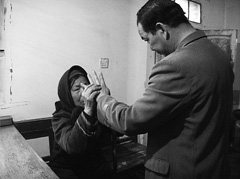Doctor Ma’s Country Clinic
 CHINA / 2008 / Chinese / Color / Video / 215 min
CHINA / 2008 / Chinese / Color / Video / 215 min
Director, Photography, Sound, Editing, Producer, Source: Cong Feng
Dr. Ma’s Eastern medicine clinic is located in a village settled in the mountains of Gansu Province. Due to several bad harvests, many of the laborers in the village, men and women alike, have left in search of work in other farming villages, construction sites, and coalmines. At Dr. Ma’s clinic, an endless succession of patients: a mother with her sick child, women and men with work-related injuries, joined by visitors from other villages. The clinic where people come for relief from physical malady becomes a veritable waiting room of life, as the camera patiently listens and watches people share the joys and sorrows of their lives. The film weaves a tapestry from the richly expressive variety of people’s lives and their views of life and death.
[Director’s Statement] The first time I entered this clinic I was left with an extremely strong impression, similar to a feeling of time flowing backwards. The furnishings and the expressions and clothing of the patients appeared as if they were disconnected from what’s happening today, as if they were frozen in the past. I don’t know why this space made me recall my childhood because my birthplace is 2,000 kilometers away.
When I started filming, Dr. Ma and I had a conversation, and I told him that what I wanted to film was not him but the patients in his clinic. After filming for the first couple of days, I felt that I was able to be accepted by the people, and was able to gradually enter more deeply into “the heart of the clinic.” In fact, from the point of view of the patients, I was the most useless person there, so my principles for filming were never to obstruct the doctor’s treatment for a good camera angle, even if it meant compromising the image. In this way, I could avoid influencing the people being treated.
I was deeply shocked by the intensity with which the people talked about death and suffering. Once or twice, holding the camera and standing in the middle of the people, I had to try hard not to show my own feelings while listening to their histories of suffering. Inside my heart, I felt uncomfortable and mournful.
In 2008, I again visited Huangyangchuan to shoot a new film. By then, Dr. Ma’s clinic had moved to a new location. I again frequented the clinic quite often. One day, I saw the blind old lady whom I had seen at the old clinic when she came to see Dr. Ma, accompanied by her grandchild on that snowy day. She looked older and drained of energy, as if the light had completely disappeared from her face. She was nearing her end.
 Cong Feng
Cong Feng
Born in Chengde, Hebei Province in 1972, Cong Feng worked at the National Satellite Meteorological Center from 1995 to 2000. He served as a culture editor of a weekly newspaper, the International Herald Leader from 2002 to 2005. A collection of his poetry, Invisible Train, was published in 2002, and his photographs were selected for the New Chinese Photography section of the Pingyao International Photography Festival the same year. In 2006, Masmediacspoeshitry, a long poem, was published by SubJam Studio. Cong began making documentary films in 2005. |
